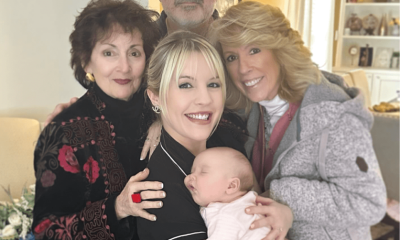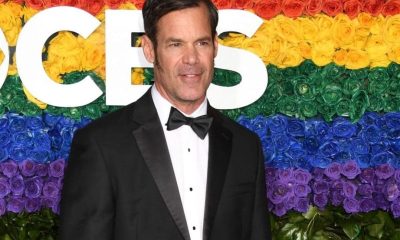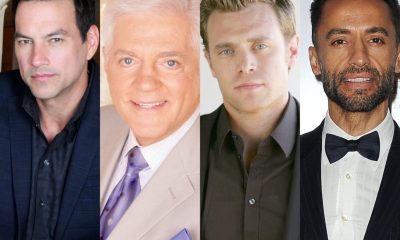Interviews
The Jeff Giles Interview – Llanview in the Afternoon: An Oral History of One Life to Live


Courtesy/JGiles
In a time when fans are awaiting to find out the fate of the beloved One Life to Live once again, writer Jeff Giles just recently released his un-authorized history of the series in the book titled Llanview in the Afternoon: An Oral History of One Life to Live. The self-published book is available at Amazon.com and via a kindle.
Taking a look back through four decades of the series on ABC and its often quirky, heartbreaking, shocking, dramatic, or even at times, non-sensical storylines, Giles speaks to countless producers, former and current cast members, and behind-the-scenes crew to learn some of the untold story about what went into making the series, the backstage drama, and how the show often times struggled to find its own identity in the early days sandwiched between ABC Daytime heavy weight brands, General Hospital and All My Children.
On-Air On-Soaps chatted with Giles after reading the book ourselves, where we were stunned at some of the admissions he related that some cast members told him, and never before heard backstage tales. So if you are a long time fan of the series, buckle up and read below at what Erika Slezak (Viki), Nathan Fillion (Ex-Joey), Hillary B. Smith (Nora), Brandon Buddy (Cole), Anthony Call (Ex-Herb), and many more had to say on a myriad of topics! Jeff clarifies to us that his intent to write the book was to share his passion and love for the series, and give credit to the hardworking men and women who have worked tirelessly to bring Llanview to life for now 45 years.
MICHAEL:
How long did it to take you to write this oral history of One Life to Live, which seemingly contains quotes taken from many interviews with people in front of the camera, or behind the scenes, during OLTL’s ABC days?
JEFF:
Courtesy/IMDB
It took me a year and half to write it. I think it helped by the fact that I was talking to people who were not on the show, and had not been on the show for a very long time, and did not have a stake in One Life to Live, or were even acting anymore. The first person I spoke with was Tony Call (Ex-Herb Callison), and then I went to Marilyn Chris (Ex-Wanda Wolek), and Michael Storm (Ex-Larry Wolek). I also spoke with Bob Woods (Bo Buchanan), who has still been part of the show, whose phone number I got from Marilyn Chris. That was another way that it happened. People would talk to one another and suggest other people for the book, for the most part. Nobody seemed very concerned that it was un-authorized.
MICHAEL:
When you read the book there are some jaw-dropping moments for One Life to Live fans that they may never have heard about before. For instance, I have not heard Erika Slezak (Viki) talk this candidly before, either. So then people call into question the validity of the book. What would you say to that?
JEFF:
There were people, and she was part of the group, that told me things that were off the record, and it did not make it in. There were things people told me that did not make it into the book, actually. A lot of the conversations were even more candid then what ended up in the final book, because I didn’t want it to be a dirt-digging expedition, because that was not the point. I did not want anyone to grind any axes in here, with the exception of Ellen Holly (Ex-Carla Hall) because I knew it was already public record, and that is why I sought out Arthur Burghardt (Ex-Dr. Jack Scott) to ask for his side of the story.
MICHAEL:
Courtesy/Ebony
Speaking of people from the past, one of the more heartbreaking things in the book is kind of following the downfall of actors who were being phased out, or were just written off, after years on the show!
JEFF:
Steve Fletcher (Ex-Brad Vernon) and Michael Storm (Larry Wolek) are a powerful example of how brutal daytime can be! In theory, it’s an open-ended gig; the show never stops. It’s such a weird thing for an actor to assume a character that is supposed to go on and on. And you often don’t get to have closure; especially guys like Michael Storm.
MICHAEL:
So, why did you decide to write Llanview in the Afternoon: An Oral History of One Life to Live?
JEFF:
I am fascinated by the medium in general. I think it’s loaded with possibilities that are often, for whatever reason, left untapped. I am concerned for a number of reasons for the way it’s dwindled for the last decade in change. When I interviewed Paul Glass (current musical director at GH), that was my in, and if it hadn’t been for his stories, and more importantly his encouragement, I don’t think I would have had the gumption to do it. The more I thought about it, the more I thought somebody should do it, and it did not seem like anyone was going to do it.
MICHAEL:
Who shocked you the most when speaking to them?
JEFF:
Probably Joe Stuart (executive producer OLTL 1977-1983). I was terrified to talk to him after all the stories I had heard about him. In the book, there are a lot of stories about what a tyrant he was on set, and that he kept a punching bag in his office, and he fired people for inscrutable reasons. Everyone lived under this terror of being called into his office. When I talked to him he was this sweet, good-humored older man. We had a warm conversation.
MICHAEL:
Courtesy/ABC
At the very beginning of its run, OLTL was about a diverse group of families of different social and economic backgrounds. You had the blue collar Wolek’s, the Jewish Siegels, the wealthy Lords, and an African-American family in the Halls. It almost seemed that after Judith Light left the show in the early 80’s as Karen Wolek, the show got away from what made it originally groundbreaking, and at times it looked like it was fighting so hard for an identity.
JEFF:
I am guessing, much like me, you saw every ten to fifteen years they would have a new little pocket of token minorities kind of bubble up for a little bit, and then fade away.
MICHAEL:
So many producers changed up One Life to Live in the early days; that if they had kept it to what it was at the beginning, it would have been a defining show in the ABC lineup instead of the least known of the ABC Daytime brand fighting for recognition between General Hospital and All My Children.
JEFF:
You are absolutely correct! And, I think a whole other book could be written about how everyone grossly misunderstood what Gloria Monty was doing at GH, and how deeply it affected every other show in daytime. And as far as getting away from its original identify, all OLTL had to do was go back to what they had at the beginning.
MICHAEL:
Courtesy/YouTube
There was a really interesting moment in the book where Tony Call admits to a director’s note he was given on how to play the classic courtroom confession, where D.A Callison is grilling Karen and breaking her down bit by bit! Apparently, Tony hated his performance!
JEFF:
I was fortunate to speak with him right after the OLTL Marathon on SOAPnet, shortly before they went off the air on ABC. So his performance was fresh in my mind, and I remember thinking,” Oh, my God. This is so over the top.” My clear memories of Herb are from the 80’s, and not that period. And I remember him being a much more naturalistic actor. So, I wanted to ask him about that. He was very funny. I really enjoyed hearing how he would go to real courtrooms and watch lawyers at work, and try to emulate what they were dong, and how ashamed he was of his own performance in this really iconic moment in the show’s history.
MICHAEL
“Solaramite and the Big 80’s” is the name of a chapter in the book, which harkens to the ridiculousness of some of the story arcs and themes at that time!
JEFF:
That storyline in particular reminds me of that weird interlude in OLTL’s history where they were kind of fumbling about, and it was mentioned in passing in the book, how Asa had a western bar and people hung out there, and they dabbled in country singing for a little bit Bo owned a football team for awhile, and there was a period in the early 80’s where they did not know which direction they wanted to go. But, that was an inadvertant prelude to all the stuff Paul Rauch (former OLTL executive producer (1984-1991) got up to with the Wild West, Heaven, and Eterna storylines. I wish I had gotten more people to talk about Eterna, because that is the one that really is ridiculousness to me.
MICHAEL:
Courtesy/ErikaSlezak.com
I love when Erika Slezak talks about working with props like the papier-mâché looking rocks in the underground city of Eterna scenes! She said in your book, ” So here were these two grown men, respected actors and directors, digging a hole in the studio floor to find the entrance to Eterna behind little papier-mâché rocks.”
JEFF:
I was lucky with that too, because those scenes were also on the OLTL SOAPnet marathon, and Erika was in scenes with the actor who played the Native American spirit guy called “Bright Eyes”. My question to Erika was, “What is your approach to carry a scene like that, because it was obvious that the guy was not an actor, and you are surrounded by all of these very fake-looking props (I mean it looks fake on the TV screen. It has to look ten times faker on the set.) How do you sell the material?” And that was her response, and she told me the director of that scene had to read “Bright Eye’s” lines to him one by one from off-camera as the scene was being filmed … he was that bad!
MICHAEL:
So in your book, Clint Ritchie’s (Ex-Clint Buchanan) drinking problem is discussed. Erika Slezak seemed to have a good perspective on the situation, though.
JEFF:
There was no judgment from her at all. That story from her in the book, where he accidently throws a chair at her and she ends up stopping the scene, I left it in the book because she told it as part of the story, that the main condition for him re-signing with the show was that they needed to buy Erika a director’s chair, or he was not going to come back. I thought that highlighted what a complex guy he was, and how complicated it was for everyone else who had a relationship with him. Michael Storm talks about how he did not like working with Clint. There were a couple of other people who talked about how belligerent he would get on the set, and how kind of mean he could be. But, he was not always like that. He was talented, and I thought Erika seemed to have a clear picture of who he was. I never was of the opinion that he was judging him for his behavior Linda Gottlieb (Former OLTL executive producer 1991- 1994) tells a story about showing up to the set on a Monday morning and the cast is in the middle of filming this dinner scene. Clint showed up with bandages on his face, because he had gone out and done what they call “getting a little work done.” She flipped out and was livid, because they had to change the storyline completely because his appearance had changed.
MICHAEL:
Out of all the producers that you discussed with former cast members, or behind the scenes personal, was there one producer who stood out as the most favorable?
JEFF:
Courtesy/ABC
No one said a bad word about Frank Valentini, and no one said a bad word about Jean Arley, either. But everyone loved Frank Valentini, and how he earned his stripes under Paul Rauch.
MICHAEL:
In the book, there is a point where Hillary B. Smith (Nora) talked about one of the grossest moments in the shows story, involving Roscoe Born (as Mitch Laurence)?
JEFF:
She said, “She was so turned off by her own show, because she was so turned off that he was trying to rape his daughter, while spouting bible verses!” (Laughs)
MICHAEL:
How was Roscoe Born to talk to? Mitch was such a heinous character, but the series always found a way to bring him back!
JEFF:
Roscoe was wonderful to talk to. I think he is funny. He will say things and contraindicate things – such as: he did not really care for the daytime stigma, but then talk about how it affected his career, and all the roles that it cost him, and the personal embarrassment of how people treated him because of it. He was very open about that.
MICHAEL:
Courtesy/YouTube
One of the things mentioned in the book that is fascinating is that during the closing arguments in Todd’s rape case, (that Hillary B. Smith won the Daytime Emmy for) she related to you that she overstepped her bounds and re-wrote a lot of the closing argument from the original dialog given to her, by then OLTL head writer, Michael Malone.
JEFF:
I can tell you that Michael Malone and Hillary are still friends, because it was Michael who put me in touch with Hillary.
MICHAEL:
You also reveal how a beloved favorite, Marilyn Chris (Ex-Wanda Wolek) decided she was done with the show. I remember watching the show back then. All of a sudden, Marilyn was gone!
JEFF:
She did not want to do it anymore. Marilyn was so afraid they were going to make her an offer she couldn’t refuse, so she begged them not to give her any financial figures. She just said, “No, I can’t do it anymore.” I think she saw the way the show was changing, and I don’t think she was really one of the actresses that had an allegiance to daytime. I think like for a lot of other actors, it was a terrific way for her to subsidize her theatre career, and then she did not need the money anymore. She was not working as much, and the landscape of the show had changed to such a great extent, it was easy for her to let go of the character.
MICHAEL:
Where does your book end … because right now, there is a huge cliffhanger for fans if One Life to Live will see a second season with Prospect Park?
JEFF:
It ends after the first season of the revival of One Life to Live, and interestingly enough the way that Prospect Park constructed their sets. At ABC, the actors would come and go all day long for block/ taping schedules. At Prospect Park’s version, the actors would have to be on set mostly all day long. Both Erika and Hillary said it had the effect of restoring some of the theatre and repertory feeling to the company, and restored some of the comradarie they had in the old days. I thought that was a nice way to bring it full circle. I was really struggling to end the book on a happy note. Since the “shelving” news came out just before I thought I was done. So I ended it on a question mark … rather than a period.
Courtesy/ABC
MICHAEL:
Castle star Nathan Fillon (Ex-Joey Buchanan OLTL) also participated in the book?
JEFF:
Yes, he was wonderful. The sense you get from him is he is a passionate defender of daytime. He tells a great story of Bob Woods in the book where Nathan credits One Life to Live with giving him all the tools to become a successful actor, and how they gave him an acting coach. He was green, and he picked up all these skills. Towards the end of his contract Bob Woods set him down and said, “You are going to leave. No matter what, you are going to tell the network you are leaving at the end of your contract. And, you are going to go to L.A. and do whatever it takes to get your career off the ground. And if you try and you fail, you can always come back to One Life to Live. But if you try and you stay, you are going to find yourself trapped in what Woods called, ‘Golden handcuffs’.” It is his way of describing the soap actor’s lifestyle. You get locked into that role for so many reasons; some of which are the steady work and money. You build a lifestyle, and you have mortgage payments to make, and you can’t get out to do other productions because you are always on the soap. Then sometimes casting directors don’t want to see you because you have been on a soap. For someone like Woods, it gave him a good life and lifestyle. When Nathan Filllon told that story, and he looks around and sees everything he has, he knows he owes it to Bob Woods.
MICHAEL:
You also had a great story about Brandon Buddy coming from Texas and landing the role of Cole Thornhart.
JEFF:
I spoke with Brandon and how he got the role. His manager told him, “You are not going to get the part, but go out to New York and have fun and treat it like a vacation.” Brandon said he went out and tried out with all these other guys in the room, who were trying out for Cole. After the auditions, somehow Brandon ended up ferrying all of these guys back to the hotel they were staying at. And as he is driving them back to the hotel, they are all telling him how sure they are that they got the role! (Laughs) Brandon seems very self-effacing and down to earth.
Courtesy/ErikaSlezak.com
MICHAEL:
The AIDS quilt storyline was one of the most emotional and remembered storylines in the history of OLTL, and so important for its time. Roy Thinnes did a remarkable job at playing Sloan Carpenter, who dealt with coming to grips with his own son being gay, and also falling in love with Viki, and eventually dying. But what went down behind the scenes, according to you in the book, was also intriguing!
JEFF:
Linda Gottlieb and Michael Malone lured Roy Thinnes back to play Sloan, after he played his other role on the show of Alex Crown. He talks about how Alex was killed, and then they called and asked him to come back and he said, “My character’s dead!” Linda woo’d him back, because first he wanted to work with Erika Slezak and second, the story of the crusty old military guy who learns to accept his gay son, appealed to Roy. Unfortunately, it did not end very well. They were playing him against Clint Ritchie, and Linda wanted to make a triangle on-screen. Clint got hurt with a tractor accident and they had been meaning to get rid of Sloan. But then when Clint got hurt they knew they needed to keep him around, and so they signed him to another deal. And then when Clint got better, they decided to get rid of him. And Peter Miner (Director, OLTL) said in the book, Roy was miserable because they would not tell him what Sloan was dying of, and he had no idea what was happening.
MICHAEL:
As someone who watched the show for a big chunk of time, went away from it and then came back to it years later, what are your favorite storylines or characters of all-time?
JEFF:
Photo Credit: ABC/Getty Images
When those three characters; Todd, John and Starr went over to General Hospital after One Life to Live ended on ABC, I was excited about the idea of it, as I wanted to see the characters continue, but seeing them in a different context really drove home for me that my fondness for OLTL was never really about any particular character, or couple. For me, it was the sum total, and all of those characters in that place of Llanview. And part of what was so gratifying about me coming back to One Life to Live after not watching it for so long was that sense of place. I mean, obviously, it wasn’t completely the same, but a lot of it was. That felt good.
MICHAEL:
When you watched the final two episodes of One Life to Live on ABC, and the sheer brilliance of the writing, production and acting, what was the most moving moment for you as a long time fan of the show?
JEFF:
The really moving moment for me was in the final episode when Bob Woods turned to Hillary B. Smith and said, “I love you, Red.” He said it in such a way that you could tell that he meant it. He was in tears, and I told him how much I loved that scene. There are a few moments from the last few years of the show on ABC that also were so emotional impactful to me, and one of those was when Viki and Jessica (Bree Williamson) are together and Jessica remembers that her baby died. Instead of going over the top like a soap might, it was so quiet. They just held each other.
Courtesy/JeffGiles
MICHAEL:
What is the picture on the cover of your book supposed to be? Fans have been inquiring!
JEFF:
Well, I knew I couldn’t use any logo, or any still from the series, so I had to improvise. So I went to a stock photo company, and used a picture from the Philadelphia Town Hall, because it reminded me a bit of the opening credits of OLTL from the 80’s.
MICHAEL:
When, or how were your interviews with Erika Slezak (Viki) conducted? Why do you think she wanted to talk with you about all things OLTL?
JEFF:
There were two interviews with Erika, actually. She called me, and we talked for a while, and she invited me out to her place in Vermont. And, we spent an afternoon doing follow-up stuff. It was wonderful. Erika made me quiche! It was surreal. I think the other thing people might want to take away from this, is often soap actors don’t have a chance to talk about the craft of acting in the context of daytime. There is an incredibly unique thing they do of inhabiting one character for gross quantities of time, and using the character to traverse these insane emotional landscapes. I think she was maybe glad for the opportunity to talk about all of this stuff.
MICHAEL:
What is that you want fans to takeaway from your book? Was this a project done out of love for OLTL?
JEFF:
Courtesy/ABC
Yes, this was a project of love, and that is all it is. I tried to write in such a way that even if you did not see the show, it’s still an interesting read. I never really understood how deeply the odds were stacked against the people that worked on the show, from the actors, to the writers, to the producers. They were always barely on the edge of the whole damn thing falling apart. I think that is what carries through in the book, that as much as people may want to make fun of, or laugh at soaps, there is a lot of profound emotional drama that comes out of those shows. It’s the only type of drama you can get out of a long form narrative, and that is on a soap opera. The fact that it works as often as it does is a real testament to the skill, and the craft, and the dedication, and the effort that went in to those shows.
Thank you for this interview. I got the book on my kindle as soon as it came out and now i’m in the process of rereading it. A book like this takes a few readings to get everything to sink in…it’s so great! a Must-have for all OLTL fans!
Thank you for the interview! Fascinating. Reading the book now.
This is a must own book for ANY soap fans, even if they never watched OLTL. *Finally* truly candid remarks, and the whole he said/she said format helps let the viewer make their own mind up about what happened. Especially thrilling to hear so many stories of the early years of the show–there’s always been so much mis-information (ie just how involved was Agnes during the 70s? Again, from a few different comments you’ll have to decide for yourself.)
I bought the Kindle edition when it first came out–even though I have no Kindle (I used the free computer Kindle reader) but a few pages in, knew I wanted it to be kept with the few favorite soap books I have (Schemering’s 1980s Soap Encyclopedia, Dan Wakefield’s All Her Children) so finally bought the on-demand print edition. Can’t recommend it enough–it has gossip about actors, insight about the struggled of putting on the show, details on storylines and writers… Just brilliant. I wish other soaps had a book like this.
Thanks for letting us know about this book a while back. It is fascinating – I can’t put it down! Brings back lots of memories of beloved actors and storylines.
I am half way done with the book it was written well not a tell all vibe , Ms holly seems to have issues. It would be nice if Erika would write a book about OLTL / her life she a classy lady and would not scandalize thing s, but I read somewhere that she wouldn’t write a book , but she did say she wouldn’t be on twitter their and she is on twitter , she tweets sometimes . so maybe u should ask her michael.
Hi Fran –
I have been hoping Erika Slezak writes a biography that would have OLTL at its center . It would b a fascinating read for any soap fan as her view of over 40 years on the sam show would be a unique and thoughtful read.
Thanks for writing this book. Hope to pick it up soon.
Will read it every day at 2:00pm, turning off the tv.
Maybe PP will see the sales and realize what they are missing out on.
Ordered this book the day Michael posted about it and couldn’t put it down. Well worth the money and a must have for OLTL fans.
This books is a delight and so entertaining and written with meaning. I ordered the Kindle edition as soon as I heard of the project. I am greatly enjoying it. Grew up with OLTL and hung on through all the shifts. The original premise of living in a diverse community with its class and economic struggles is the golden age for me. Loved it then.
Thanks Jeff. One Life to Live is my favorite soap and I enjoyed the excerpt above and mention of all the past characters. I didn’t know about your book until I read it in the interview but I immediate went to buy it. I know I will enjoy it since it is about characters that filled an hour of my day for so many years. I surely hope PP puts OLTL back on soon. I just hope it is soon. Thanks again for the book Jeff and to Michael for telling us about it.
Hmmm…I wonder…I wonder if Jeff Giles’s, um, book includes the following tidbits:
1. When Linda Gottlieb was OLTL’s executive producer in the early 90’s, Phil Carey tried (more than once) to undermine her authority. At one time, he even tried to get her fired.
2. Basically EVERYONE on the OLTL set HATED working with Barbara Luna because she was too difficult and demanding to work with. Clint Ritchie ESPECIALLY hated working with her.
3. BOTH Joe Stuart and ESPECIALLY Paul Rauch treated Ellen Holly like dirt.
4. Paul Rauch VERY CRUELLY fired BOTH Ellen Holly and Lillian Hayman will little or no explanation.
5. James DePaiva (when he was married to that Hee Haw chick Misty Rowe) kept bringing his marital drama to the OLTL set. Constantly.
In short…D-A-M-N!!!!!
I loved the courtroom scenes from when Judith Light confessed that her character Karen was a prostitute. I was too young to watch when these scenes first aired; but, I have seen them since in reruns; and what fantastic scenes! That’s what I miss about daytime, cliff-hanger Fridays, great, diverse storylines, like when Tad was sleeping with Marion and Liza on AMC, Erica was having an affair with Travis’ brother, Jack on AMC, old-style Luke and Laura on GH, the adventures of the WSB on GH and all of the 80’s icons, dramatic heat from Sonny and Brenda on GH, etc. Now, it’s a lot of recurring actors with hardly any talent (newbies on GH) or attempting to resurrect a character (OLTL characters on GH). I watch daytime for drama and romance! It’s an escape for me!
Does the book mention ANYTHING on Jacqueline Courtney and George Reinholt? I wonder if it touches on her affair with Joseph Stuart or how Robert S. Woods wasn’t that thrilled with her. Also, from what erika has had to say about Clint Ritchie, it seems that he was VERY much like George Reinhol, an emotionally tortured person who ALSO threw a chair on the set (that was during his “Another World” days- he threw it at AW director Ira Cirker in rage over Pete Lemay’s scripts- it’s been said that this particular incident led to his 1975 AW firing). OLTL picking up those two was a turning point in the show’s history, and then George made the now-ludicrous decision to leave the show only after two years! Was George Reinholt interviewed?
Charles…honestly, I forgot about Jacqueline Courtney. Dude…that DOES NOT surprise me at all that she had an affair with Joe Stuart. I once read somewhere that (when she was alive) Jacqueline had affairs with SEVERAL soap opera executives over the years. And, Jacqueline was downright MEAN AS HELL to other soap opera actresses and MOST soap opera actors TRULY HATED working with her because of her snobby, demanding and diva-like ways. Most of all, I wonder if Jeff Giles interviewed Jacqueline’s daughter for his book? Supposedly, Jacqueline’s daughter knows ALL of Jacqueline’s deep, dark secrets. Every last one of ’em!!!!!
Charles…take care, dude. Peace.
Well, I do know that for her last P&G contract on AW in the mid 70s she demanded her own dressing room with a toilet- and she got her wish!! This reminds me of how Joan Crawford had her own private toilet in her dressing room at MGM in the 30s, a fact that impressed Greta Garbo during the filming of “Grand Hotel”. George and Jacquie were very seemingly exclusive members of their own club on the AW set, so to speak, and apparently openly critized the work of fellow performers- just one reason why the rest of the cast didn’t mind saying goodbye to both actors when they were fired. Just before Paul Rauch came to produce OLTL, Jacquie’s contract wasn’t renewed, and according to her she was to be Dorian’s rival for David Renaldi’s affections instead of Jenny Wolek Siegel Vernon Janssen. Obviously ABC didn’t want a repeat of the Rauch vs. Courtney war from the 70s at AW- they valued Paul Rauch more than one of their biggest stars!
Avatar, check this out…back in the day, when she was on both Another World and (especially) One Life To Live, Jacqueline Courtney (over the years) did SEVERAL interviews. Interviews openly criticizing and OPENLY BASHING fellow co-stars from AW and OLTL, writers, producers, directors, crew members, etc.. One time, she even did an interview bashing BOTH NBC and (especially) ABC (aka the networks). Well, eventually, Jacqueline was pretty much forced into retirement because NO ONE in the soap opera community wanted to work with her anymore and (after a while) basically EVERYONE got tired of dealing with her. Period.
Take care, Avatar. Peace.
Avatar…check out these, um, other tidbits about Jacqueline Courtney:
1. When she was on BOTH AW and OLTL, Jacqueline used to annoy and irritate directors with her so-called and “helpful” suggestions. One day, it all reached a boiling point when a now former OLTL directer had enough and TOTALLY WENT OFF on her…including dropping the F-bomb SEVERAL TIMES in front of SEVERAL people on the OLTL set.
2. One time, on the AW set, Jacqueline VERY RUDELY walked into and interrupted a private meeting between some of the AW writers.
3. After a while, cast members from BOTH AW and OLTL had enough of Jacqueline’s snobby, insufferable and diva-like ways and each told producers of BOTH shows POINT-BLANK, “It’s EITHER her or us!!!!!”
Bottom Line: Over the years, Jacqueline Courtney burned A LOT of soap opera bridges with her unreasonable, demanding and awful behavior. STUPID WOMAN!!!!!
just finished book great book . thanks .. someone needs to write A tell all book about OLTL the above comments sound juicy . Hey this sound like a drama within a daytime drama I would buy that book in a minute too.
That does not surprise me (at all) that Michael Storm did not like working with Clint Ritchie. Back in the day, on the OLTL set, ONLY Erika Slezak, Robert S. Woods and the late Phil Carey enjoyed working with CR. That was because all 3 of them knew how to deal with him and knew how to keep him in line. As for the rest of the OLTL cast (overall), they all either “cheerfully” tolerated working with CR or they flat-out HATED working with him. Period.
This is a must-read for any OLTL fan. I read it once and am reading it through again. The stories for behind the scenes of 4 decades are so interesting for the fan to read. It is fantastic that Jeff Giles tracked down so many different people from the show for this book. Bravo!
Days Of Our Lives
Matthew Ashford and Melissa Reeves Talk Return to DAYS for Doug’s Funeral, Susan Seaforth Hayes, and Their Enduring Friendship
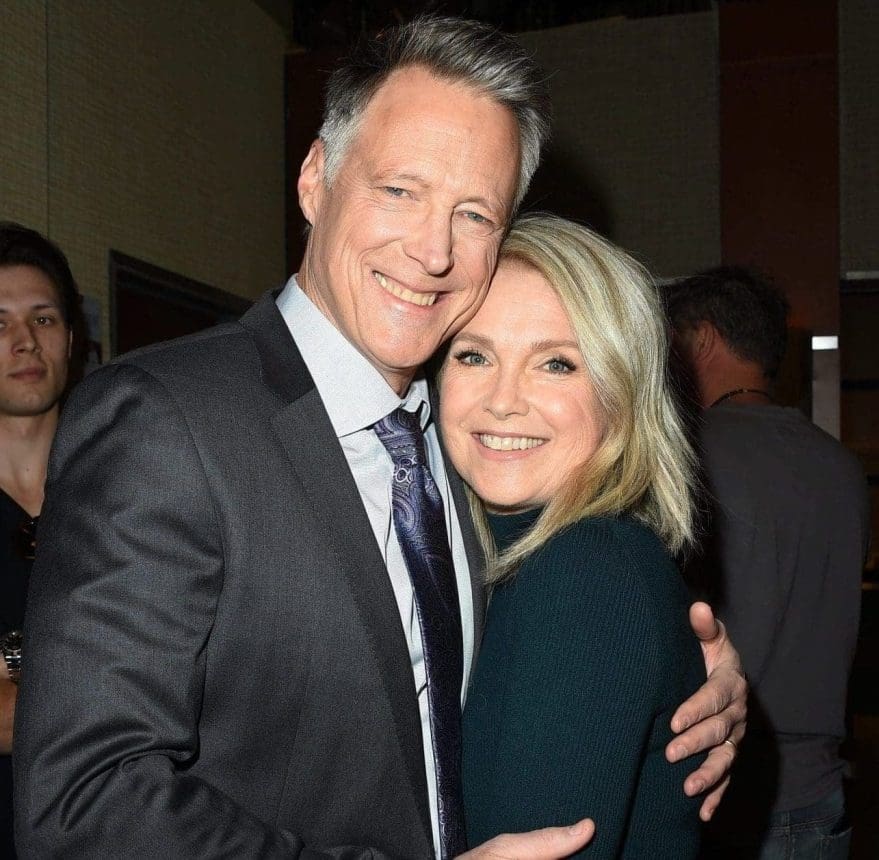
Last week, Days of our Lives celebrated the taping of their 15,000th episode which is tentatively scheduled to air on December 3rd. The story will feature emotional and heart-tugging scenes of Doug Williams funeral and honor his portrayer, the beloved Bill Hayes, who passed away on January 12th at the age of 98.
While the actors, producers, and crew took a lunch time break to pose for some pictures and speak with the press, they knew they would have to get back to taping the funeral, which was going to make it a tough day, but also cathartic for all who loved Bill Hayes.
Several returns have thus far been announced including; Melissa Reeves reprising her signature role of Jennifer Horton (a part she first played in 1985), and Matthew Ashford as Jack Deveraux. Reeves had last appeared on the show back in 2021, and she was replaced by Emmy-winner Cady McClain in her absence when Jennifer was in storylines. In real-life, Melissa had moved full-time to Tennessee along with her husband, Scott Reeves (ex-DAYS, GH, Y&R). Now, and as previously reported, Reeves will first appear back on DAYS for the Thanksgiving episodes with the Hortons.

Photo: JPI
Michael Fairman TV caught up with Matt and Melissa during the 15,000th episode celebration to get their take on: being back for these special episodes, how it has been working with and watching Susan Seaforth Hayes portray Julie’s grief over losing Doug, and how they have supported each other through the years. Check out what they shared below.
Melissa, you are back on the set of Days of our Lives for this very emotional and special moment in the series history. How does it feel?
MELISSA: Oh, my goodness. I am honored. I wouldn’t want to be anywhere else but to be here for Bill. He was like my real-life dance partner. He taught me how to ballroom dance. And to be here for Susan, of course, who’s just been our sweet hero this whole week. We’re just following her lead. She’s just been this incredibly strong example for us in the midst of this trial and season of her life. She is like just lifting us all up with her. It’s been incredible.
I was at Bill Hayes memorial service which was truly incredible and I know at the time you were in Tennessee. It was moving and celebratory of his life, all at the same time.
MELISSA: That’s all I have heard. I have to watch it on You Tube. They said it was just a real celebration of his life and I love that.

Photo: JPI
This must be difficult for Susan Seaforth Hayes depicting the death of Doug, when she is still grieving the loss of her beloved husband. (Susan pictured above with the returning Stephen Schnetzer who plays her on-screen brother, Steve Olson).
MELISSA: I’m sure Susan has those moments at home by herself, but she’s so good at being a leader and leading all of us. We’re following her, you know, and she’s like, “This is how I want to feel today.” And we’re just going along with her, you know? It’s so sweet.
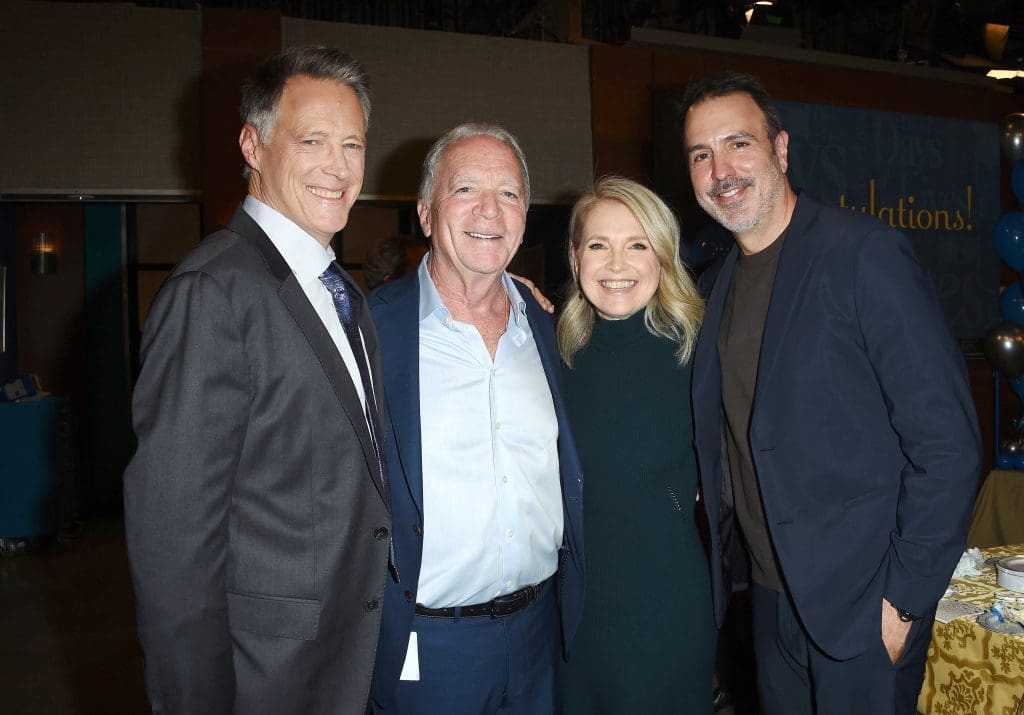
Photo: JPI
How is it to see Matt Ashford again live and in-person?
MELISSA: You know, Matt and I can go years without talking, or seeing each other, and then the minute we see each other we’re chatting away.
MATT: Melissa was out on set doing a scene yesterday on the phone talking to a stage manager; as she was telling some really tough news on the phone. I’m like crying in the background, literally, I’m off-stage crying.
MELISSA: And then we get like back into normal life, and we’re like, okay, “What’s happening? What’s happening with this … or what’s happening with that?”
I had read, Melissa, that you were in touch with Matt about if there night be a possibility for you to reprise your role as Jennifer for these special episodes?
MELISSA: Yes. Well, Matt was like, “Hey! Would you want to come back? “And I was like, “Matt, you know, I would always come back. ”
MATT: Every time I come here to Days of our Lives, they ask, “Where’s Missy? How’s Missy?” Everybody backstage says, “I miss her.” All of the crew is asking about her and saying, “It would be nice to see Missy. Nothing wrong with you Matt, but …” They said, “Where is she?” I said, “She wants to come!”

Photo: JPI
There are some beautiful photos of Missy and Bill and Susan thorough the years that I found. It just reminded me of just the deep and entrenched history we all have had with the show, personally and professionally.
MATT: Missy is roughly the age where Francis Reid (ex-Alice Horton) was when she started the show, which is just crazy.

Photo: JPI
I’ve always said Missy was going to be the next generation Alice. Do you feel that Jennifer is the heir apparent matriarch of the Horton family?
MELISSA: Yes. I mean, this has been greatest blessing of my life, and that would be great. I told Ken Corday (executive producer, Days of our Lives) when I was 17 that this show would be my life. Ken always told me, “This is your home,” and I’ve always felt like that.
How have gotten through the scenes watching Susan Seaforth Hayes as Julie go through the loss of Doug?
MATT: Susan is bringing her best performance life for her and Bill. I mean, she’s a showbiz baby. She always has been one hundred percent, and she’s doing it for him, and this is who they’ve always been. So, you’re seeing this amazing performance colored by her life. She has her private life as Susan, but she has enough plugged into Julie that she’s done amazing work. The director, producers and writers are giving her room to live in these moments and it’s quite wonderful.
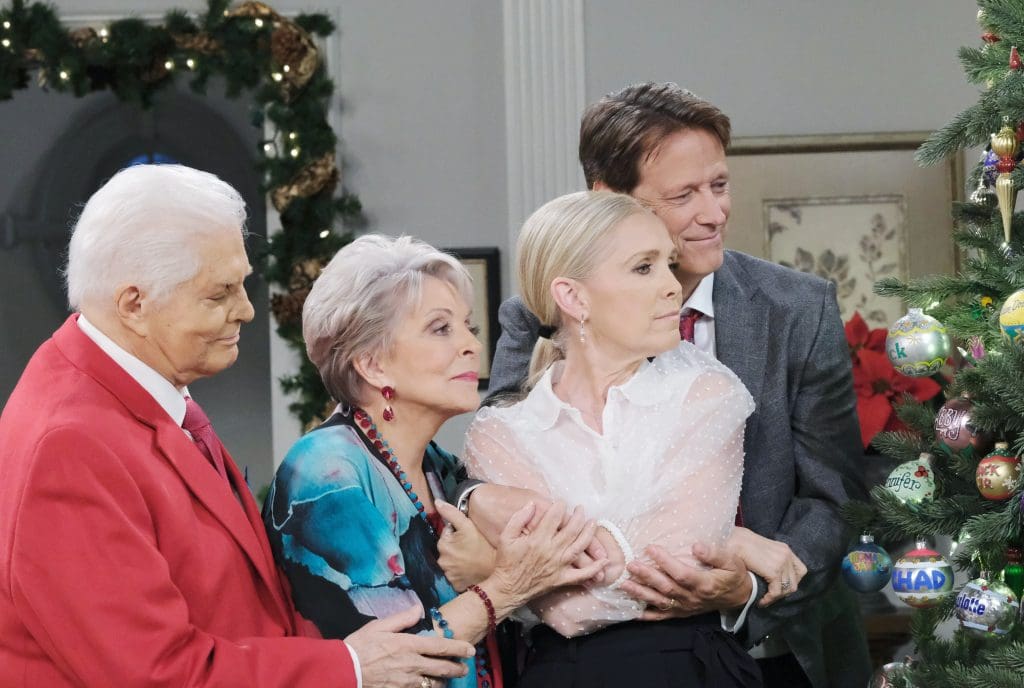
Photo: JPI
Have you already broken down in tears during the taping?
MELISSA: Yesterday, but today’s taping of the actual funeral I think they want us to try and be just more celebratory.
MATT: I mean, it is a beautiful long life for Bill Hayes and his character of Doug Williams, and so it will be about that. Then, you get a bunch of us together in the church pews, and there’s going to be hijinks.
MELISSA: We all have been through the waves of grief. You have that awful cry and then all of a sudden you feel okay. There are those family situations we are portraying where you’re like, “What do we do? What do we do now? You know, no one knows what to do. But, it’s so sweet. I’m looking forward to seeing how the scenes all turn out.
So, are you glad that Matt and Melissa are back for the 15K episode and Doug’s funeral? From what we can tell, it’s going to be quite an emotional journey for Days of our Lives fans, and especially the performance of Susan Seaforth Hayes,
Days Of Our Lives
Ron Carlivati Talks on Decision to Make Days of our Lives 15000th Episode About Doug’s Funeral, and Previews Chances for WGA Award
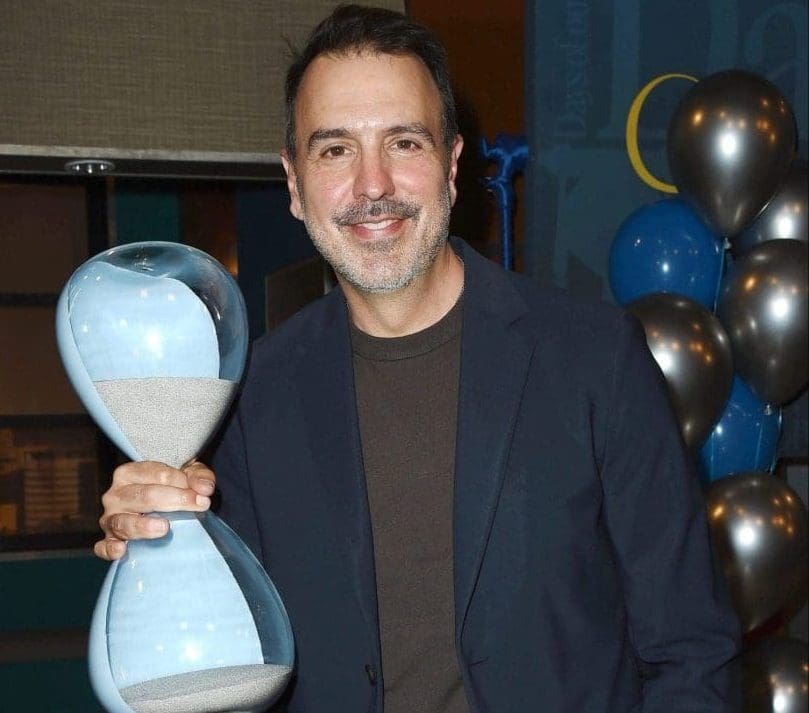
This week, Days of our Lives celebrated the taping of their 15,000th episode. In of it itself, that is an incredible accomplishment for the long-running soap opera currently streaming on Peacock.
However, this on set gathering was a bit different. Though the show is celebrating their achievement, they are also in the middle of taping scenes surrounding the death and the funeral of Doug Williams, played by the late Bill Hayes, who passed away on January 12th of this year at the age of 98.
As previously revealed many longtime favorites are back to honor Bill and the character of Doug including: Gloria Loring (Liz), Melissa Reeves (Jennifer), Matthew Ashford (Jack), Maree Cheatham (Marie), Victoria Konefal (Ciara) and Stephen Schnetzer (Steve) to name but a few.

Photo: JPI
Michael Fairman TV was in attendance and spoke with Days of our Lives head writer, Ron Carlivati to gain some insight into how the 15,000 episode was crafted and the decision to honor the character of Doug Williams and Bill Hayes as its epicenter. In addition, Ron weighed-in on this Sunday’s April 14th WGA (Writers Guild of America) Awards, where he and his writing team are facing off with General Hospital for the daytime drama prize. Here’s what Ron shared below.
Was this your idea to make the 15,000th episode centered around Doug’s funeral and passing?
RON: It was. When you’re looking at it, and laying out the calendar for the whole year and you see 15,000 is coming up, we’re like, “What are we going to do?” And then, we got the news that Bill had passed away and something kind of clicked. I was like, “We should honor Doug on that show.” So then, we started to kind of build around that … when does he pass away? How does he pass away? Who could come back? You know, it’s a lot. I’m very pleased with the returns that we got as there’s so much that you could do. We wanted everybody we could get. So, we put together a wish list and Janet Drucker (co-executive producer, Days of our Lives) made it happen.

Photo: JPI
You have Melissa Reeves back as Jennifer, when the role was last played by Cady McClain. What has it meant to have Missy back for these shows?
RON: It was so nice to see Missy Reeves. I think Cady has done such a good job, but on the 15,000th episode to see Missy as Jennifer, it’s a big deal. So having her was great, and overall, the milestone was a big undertaking, because you want to live up to it. You want the 15,000th episode to be good. Now, it has a lot of real emotion that you’re playing. because for the cast and the crew they’re honoring Bill Hayes just as much as we’re honoring Doug Williams.

Photo: JPI
Was it hard for you and the team to write this episode?
RON: Yes. I’ll tell you why it was hard to write. When I wrote, for example, Asa’s (Phillip Carey) death on One Life to Live or Victor’s (John Aniston) on DAYS, Asa is a different type of character. Like, you could have characters going, “Oh! I’m glad he is dead.” You could have different points of view, but with Doug, you’re not having that. Every person loves this man. No one had a bad relationship with him. So, you’re challenge as a writer is how do you make it that not everybody’s saying the same thing and doing the same thing. And so, we tried to find ways to make the episode about all the familial relationships and yet, how do you make it about Doug and yet broaden the scope.
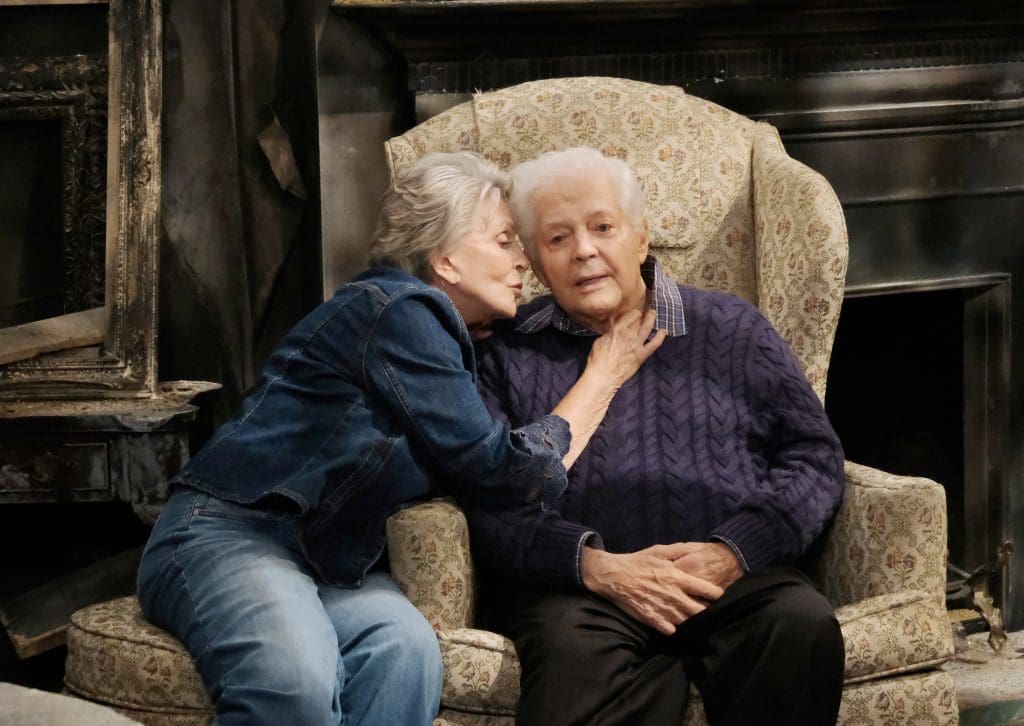
Photo: JPI
I had spoken to Susan Seaforth Hayes (Julie), a week after Bill’s memorial, for an interview. She said that she felt very fortunate that you did include her on discussions of how you would tackle Doug’s passing. How did that conversation go?
RON: First, I attended Bill’s funeral, which was incredible. I said to so many people it was an emotional service, but it was hard to be sad at this. The guy had an incredible life and it was an incredible celebration. And so, you’re sitting there watching this knowing that you now have to write something similar. And how do you write something that lives up to what you just witnessed? I wanted to talk to Susan to get her thoughts about, you know, how much do you want this to be about keeping Bill separate from Doug. How comfortable are you sharing your grief. She was incredible to talk to. It was a great chat.
You’re in the middle of taping these major scenes for the 15,000 episode to air in December. How do you think it’s going? Have you seen any of the scenes?
RON: I haven’t seeing anything. I mean, we were still making changes to the script up till this morning!
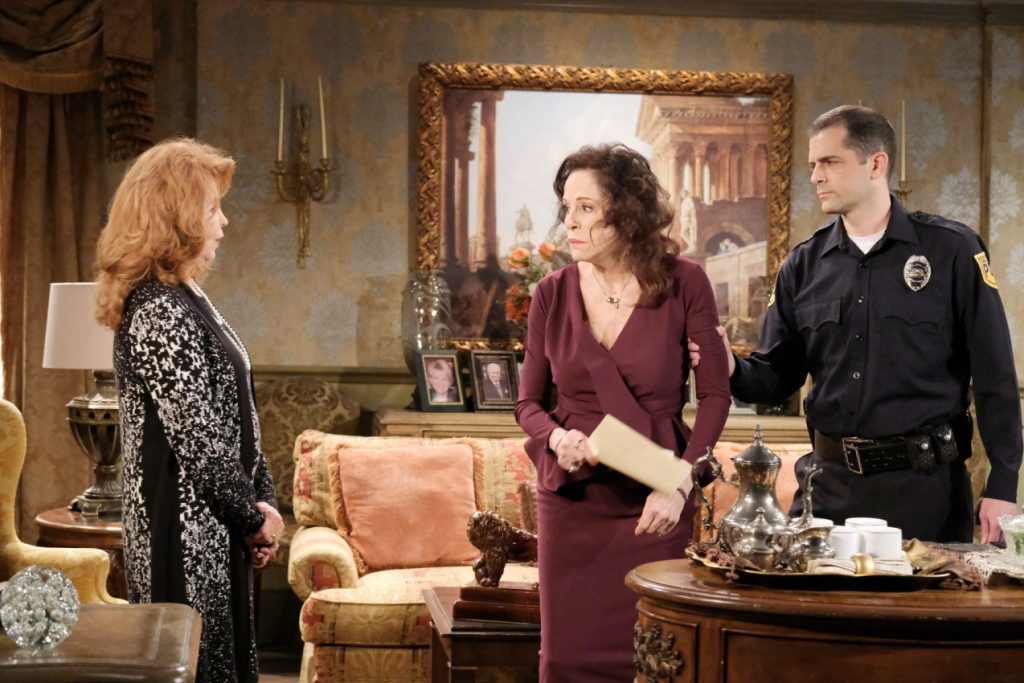
Photo: JPI
The Writers Guild Awards are this Sunday, April 14th and once again this year there are two daytime drama nominees, General Hospital and Days of our Lives. How are you feeling about your chances this year?
RON: It is often just GH and us in the category. I’ve won three years in a row, so I’m kind of feeling like it’s their turn.

Photo: JPI
What episodes did you submit for contention? If I recall, they had to do with Victor’s memorial.
RON: The episodes we submitted were centered around Victor’s funeral. I think one has story with Vivian (Louise Sorel). We had some fun stuff, we had some emotional stuff at Victor’s death, and I am pretty sure that our submission was three episodes right around that time.
Did you make the decision to go with those episodes because there was a mix of humor and drama?
RON: I like to have some humor, but it was also the funeral, then there’s Sarah (Linsey Godfrey) giving birth, and then Vivian’s crashing the reading of the will. So, we had a lot of fun and it’s hard sometimes to pick three that tell a story, as opposed to submitting for the Daytime Emmys, where the writing team only submits two shows. So, we shall see how it goes on Sunday.
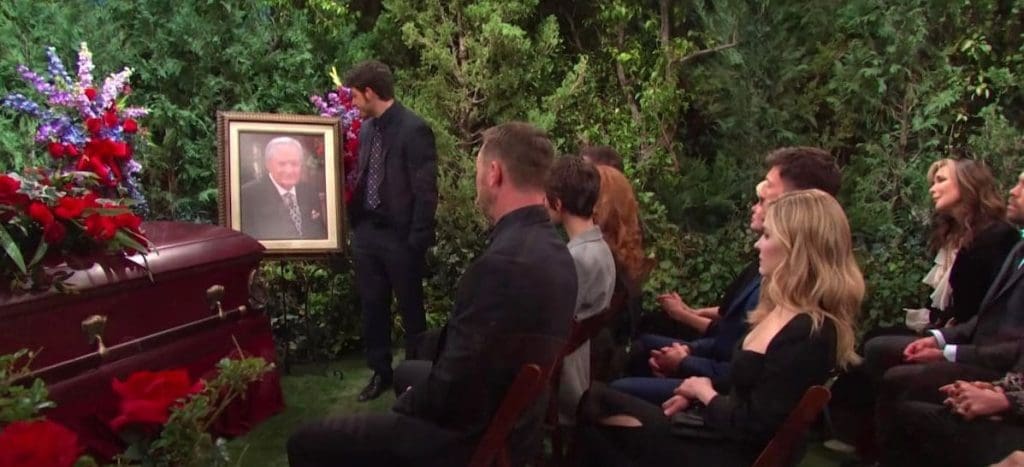
Courtesy/Peacock
So, are you looking forward to the emotional 15,000th episode of Days of our Lives? Do you think DAYS will take home the WGA writing award for daytime dramas for the 4th year in a row? Comment below.
Days Of Our Lives
(INTERVIEW) Eric Martsolf Previews DAYS Stars on ‘Weakest Link’, How He Fared in the Game, Plus Welcoming New Tate, Leo Howard

Tuesday night on NBC’s Weakest Link (9 p.m. ET/PT), the stars of Days our of Lives test their knowledge, and try to win big money for the charity of their choice on the newest season of the popular game show hosted by Jane Lynch. In case you miss it, you can also catch the episode on Wednesday streaming on Peacock.
The question on everyone’s mind is … who will be revealed as Salem’s weakest link? Who will be left standing at the end of the game? DAYS favorites: Eric Martsolf (Brady) Brynn Dattilo (Lucas), Galen Gering (Rafe), Martha Madison (Belle), Victoria Konefal (ex-Ciara), Zach Tinker (Sonny), Tina Huang (Melinda) and Lindsay Arnold (ex-Allie) play while literally having the task of throwing their co-stars under the bus. The contestant who receives the highest number of votes leaves the game throughout, as Lynch declares their exit with the now iconic phrase, “You are the Weakest Link. Goodbye.”
Michael Fairman TV caught up with Eric Martsolf, who daytime fans know is great as a host in his own right and oh-so-fun at playing any trivia game you throw at him. Martsolf gave us the inside scoop of what it was like to be on the set and backstage in a rather nerve-wracking environment, and trying to come off as smart while Jane Lynch roasts you at the same time!
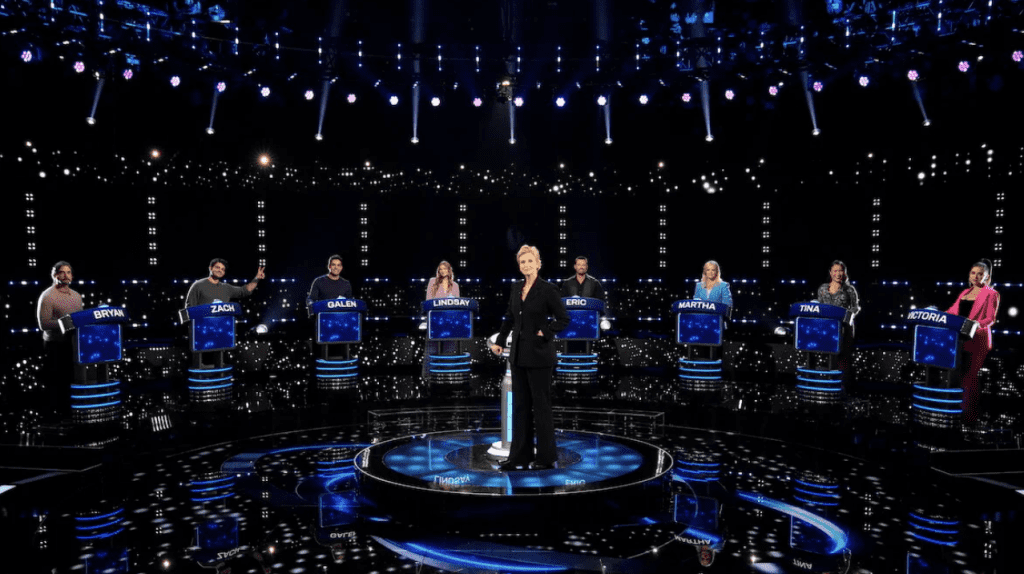
Photo: NBC
In addition, Eric shared his thoughts on the new Tate, as Leo Howard takes over the role of his on-screen son from Jamie Martin Mann on the April 5th episode of Days of our Lives, plus working with Emily O’Brien as Theresa, and the loss of the legendary Bill Hayes. Check out what Eric had to say below.
Did you know about the game before? Had you watched the original version of the Weakest Link, or this latest incarnation?
ERIC: I was very, very familiar with the game because I found, as someone who enjoys hosting, that has to be one of the best hosting gigs out there because they just have extreme liberties in belittling the contestants, and it’s all done in jest of course, but it’s great. Jane Lynch is a master.
Did you get to meet Jane Lynch before she hit the stage for the taping?
ERIC: I don’t think any of us met her prior to being on the set. So, we’re standing there behind our podiums and these cyber lights just point all in one direction. At one point when we’re out there, it was kind of a hurry up and wait thing. We’re just like, “When is this going to start?” Then, here Jane comes and in all her glory in a beautiful navy-blue suit. She just prances onto stage and just glares over at us, and starts making fun of a silly soap opera actors like you wouldn’t believe. It was just great. I’ll let the public see what how she crucified us. But it was all done in fun.
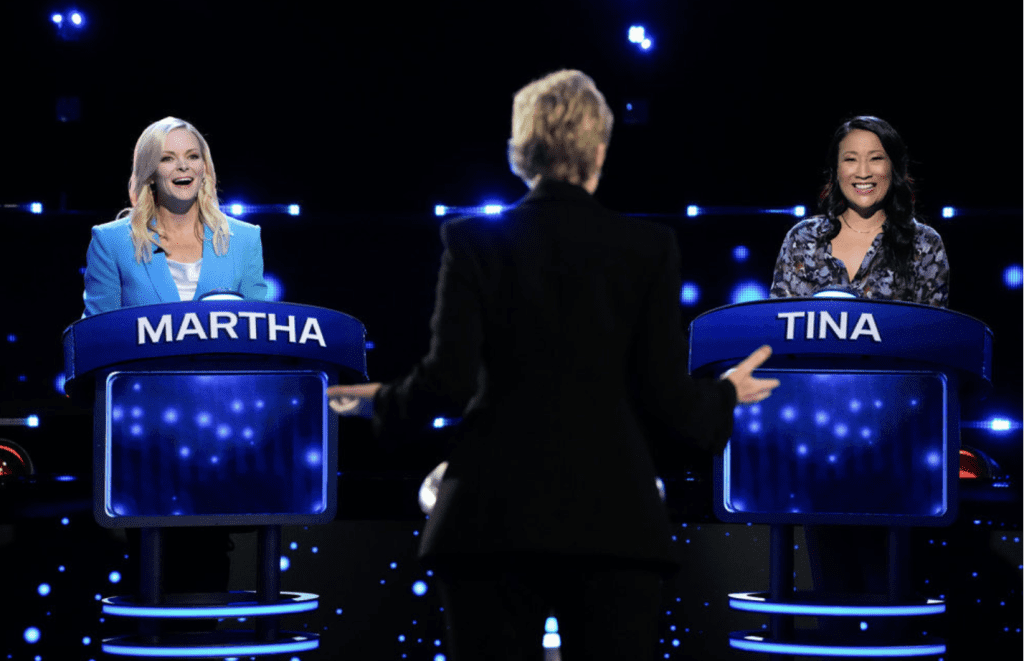
Photo: NBC
Did she crucify you?
ERIC: I don’t think anybody got out unscathed to be honest with you.
For those that don’t know the game, you try to eliminate those that are the weakest in answering questions.
ERIC: Correct, and therein lies the problem. Historically, I think the Weakest Link is comprised of contestants that don’t really know each other, and in this case, you have not only coworkers, but almost family members because we all know each other very, very well. It’s a tight circle and even more so when you’re on the same show. So, we all went in into it pretty nervous because the premise of the game is to expose the inadequacy of people’s knowledge of general facts and information. So, essentially, you’re voting each other off because you don’t think they’re as smart as you are and that they’re the least smart in the group. So, I mean, that in itself is pretty, pretty tough to swallow. It was really hard, because you have to look at your friends in the eye and go, “yeah, I don’t think you’re going to get the next couple questions. You’re not the smartest, you’re not the crispiest chip in the bag. I’m going to let you go. ”
Did you feel bad about some of the eliminations?
ERIC: At one point, without giving away any spoilers, I voted off someone that without a doubt, has more smarts and education than I do. I just felt silly. But, you know, the way the game was going, I just felt it was the right. There is a bit of strategy involved. I’m worried about the airing of this particular episode because I did fumble some questions that people are going to turn their heads and go, “Really? You didn’t get that one?” It’s so much easier to answer these questions at home in your pajamas than it is, you know, looking at Jane Lynch in the eye with 6,000 lights at your face in front of cameras. Your brain tends to wander. So yes, we all had had some answers that we couldn’t believe we didn’t get at the time!

Photo: NBC
Did it get very competitive?
ERIC: There was little competition there. If I recall, it’s Galen and Bryan that went at it a little bit and had some laughs. But again, I can’t stress this enough, it was all done with fun. At the end of the day, every one of us wanted to win. I think the smartest person did actually come out victorious.
Now in the game, for those that have never seen it, you’re on your podium, and then Jane gives a question, right?
ERIC: It’s a firing squad of questions. You only have a certain amount of time to answer. If you get the correct answer or the wrong answer, you immediately, go to the next contestant and you have a certain amount of time. And then, at the end of that line of questioning, everyone gets to vote as to who they believed was the biggest dummy in the group. (Laughs) Some questions are simple. You know, “What color is Santa Claus’ suit?” And then, the next question is “What is 648,000 times 14?” or what’s the population of some obscure country? So, that was the biggest challenge. Someone else might get, “What is the main ingredient of a banana split?” And my question could be like, “How much is 9,430 times x 59 million?” There’s an intimidation factor that Jane Lynch brings to it when she’s staring you down.

Photo: NBC
When the cast finished the entire game, what happened backstage?
ERIC: The best part was there were these post interviews that the Weakest Link conducts where you have to go into a dark black room. I think my first question was, “How did you feel about that wrong answer?” They don’t let up. They just keep jabbing at you. “Did you feel ridiculous getting the wrong answer to that fourth-grade level question?” (Laughs) There was also a lot of trash talk with that happened after the show. It got so competitive. If I recall, we were all supposed to go out together and get a meal with everybody, and that never happened. They’re like, “I’m not eating lasagna with you right now. You just voted me off!” Now, even the first person that gets voted off, you’re going to be shocked, because I thought this person would probably win it. In the game, you want the best people to remain on the panel because that’s what drives up the money.
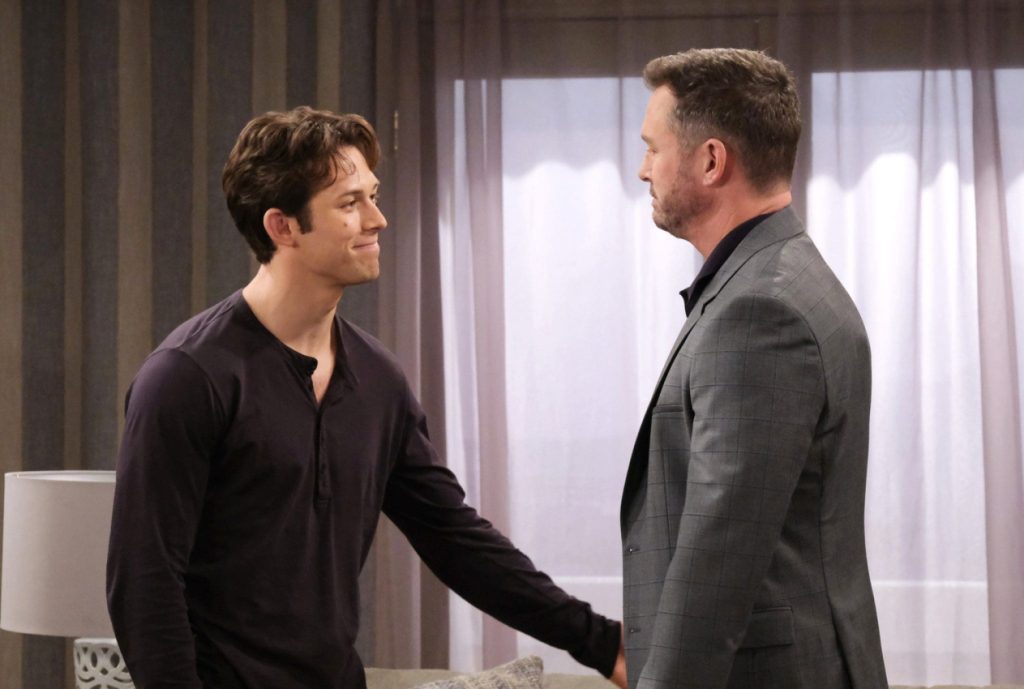
Photo: JPI
Later this week on DAYS, we will see the debut of your new on-screen son, Leo Howard, taking over from Jamie Martin Mann as Tate.
ERIC: How about that? I just did a post on Instagram, because I saw that Jamie Martin Mann had liked and hearted a post about Leo Howard coming on the show. I just thought that was so classy of him. That’s the way it’s supposed to be, “This is the new guy. Embrace him. He’s good. I’ve met him. He is a good guy.” It’s about handing off the character baton sometimes, sort to speak. I was really proud of those guys. I reached out to Jamie. He just wants to go to college and be a student. I understand that. That’s important.

Photo: JPI
Is that challenging for you as an actor since you’ve built this relationship with the one guy as your son, and now you’ve got to pivot and create a different kind of energy with someone else taking on the part?
ERIC: Leo Howard has been in the industry for a while, with some very good credits to his name. He brings a certain charisma to this role that I think people are really going to love. And yes, he’s older, but he plays younger, and he has that ability and he’s pulling it off brilliantly. I can’t wait for people to see him, but of course I miss Jamie. Emily O’Brien (Theresa) and I really grew to love him very quickly because the storyline got so deep, so quickly, with the drug intervention and then him getting beat up in in prison. I mean, as a father, that’s the kind of stuff that you have nightmares about, you know, your kids being in pain.
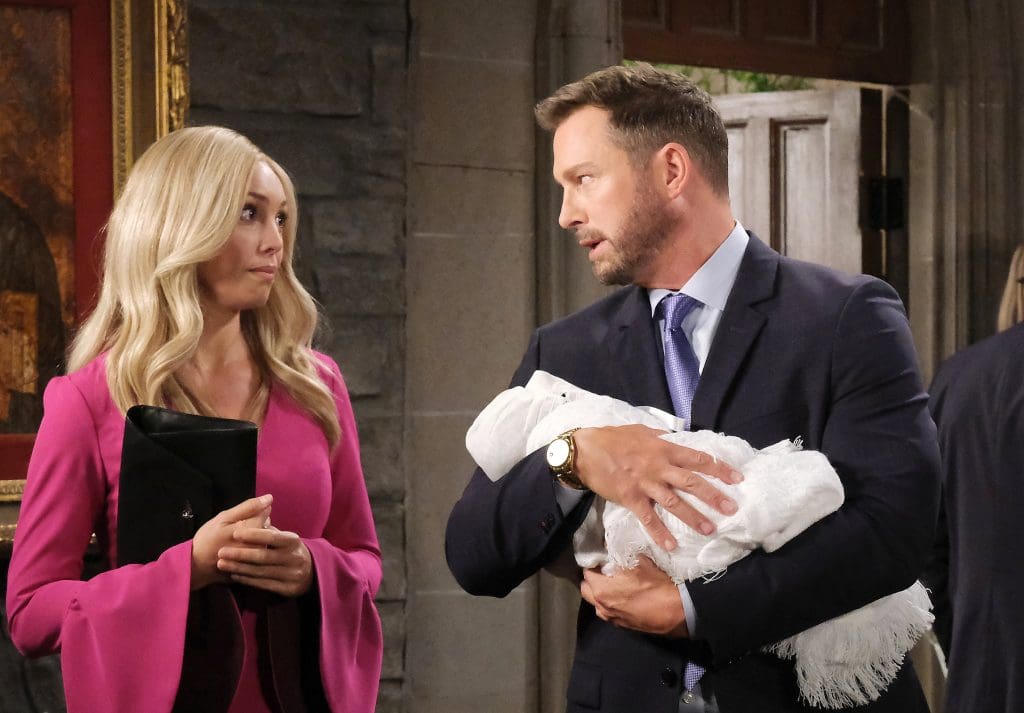
Photo: JPI
I still love the fact that Emily O’Brien is still noticeably wearing a blonde wig as Theresa. What are your thoughts on how the transition has been for you, and for her pivoting to a completely different role?
ERIC: I hadn’t worked with Emily much before, because Gwen and Brady never really crossed paths. We all saw the transition that she had to make. When I became Brady, the character hadn’t been on the map for three years. When she became Theresa, she walks out one gate and comes through the other as Theresa. We all had a good giggle about it. That’s hard to ask an audience to go, OK, I’m Gwen, now I’m Theresa.” I was scrolling through X (formerly Twitter) and I saw a couple posts from fans that said how they were really weary, at first, about accepting Emily O’Brien as Theresa. But after today’s episode, they shared, “I’m loving her as Tate’s mom, and the chemistry she has with the family.” I texted Emily and I said, “I just want to let you know that you’re just bringing it home really brilliantly, and people are starting to come around.” I think they’ll do that with Leo Howard too.

Photo: JPI
What had it been like without the iconic Bill Hayes (Doug Williams) coming to work and being part of the Days of our Lives cast since his passing?
ERIC: You really do miss that presence in the hallways. He was a song and dance guy and I am a song and dance guy. as well. I kind of find myself the lone singer in the makeup room sometimes, but I could always count on Bill. He’d be humming some old tune from the sixties. I’d start humming along and he’d just kind of lean over and take a look at me, and give a little smile. Everyone else was probably irritated at us, but we just kept singing along. and it’s like 6:30 in the morning. I think Bill was a lot like the late John Aniston (ex-Victor), in the sense that I don’t really feel like he felt he was working. He was just always having fun right up until the end. That little number he did with his wife, Susan Seaforth Hayes (Julie), and Dick Van Dyke (guest starring as Timothy Robicheaux), where he was singing along, he was just living it. It was so cute and so adorable to watch.

Photo: JPI
Your final tease for the Weakest Link tonight is, “Fans should watch because …”
ERIC: Fans should watch it because if they thought we were smart before, wait till they see the show.
You can check out the cold open for tonight’s Weakest Link “Days of our Lives special” below.
Now let us know, will you be watching Eric and his co-stars, past and present, attempting to showcase their knowledge on the ‘Weakest Link? Intrigued to see Leo Howard and Eric in scenes as new Tate and his father, Brady? Share your thoughts in the comment section.
-

 General HospitalApril 12, 2024
General HospitalApril 12, 2024George Russo to Appear on General Hospital as Carmine Cerullo
-
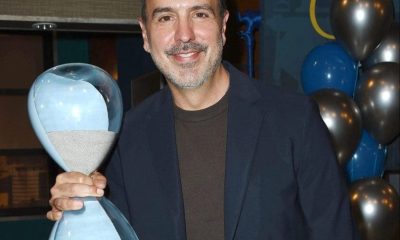
 Days Of Our LivesApril 13, 2024
Days Of Our LivesApril 13, 2024Ron Carlivati Talks on Decision to Make Days of our Lives 15000th Episode About Doug’s Funeral, and Previews Chances for WGA Award
-
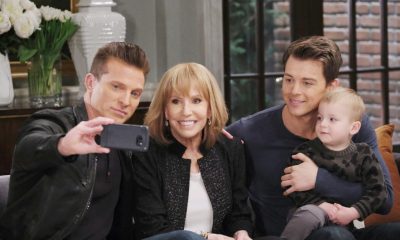
 General HospitalApril 15, 2024
General HospitalApril 15, 2024General Hospital’s Steve Burton Reveals the Emotional Scene He Almost Could Not Get Through
-
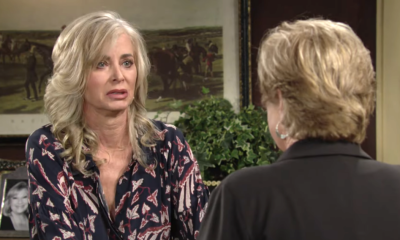
 RecapsApril 14, 2024
RecapsApril 14, 2024Y&R’s Eileen Davidson Delivers the ‘Power Performance of the Week’
-
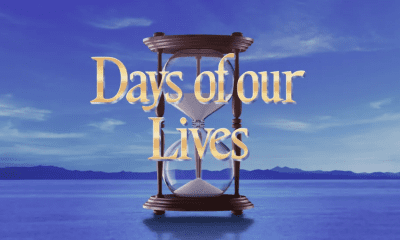
 Days Of Our LivesApril 14, 2024
Days Of Our LivesApril 14, 2024Days of our Lives wins WGA Award for Daytime Drama Series
-

 NewsApril 12, 2024
NewsApril 12, 2024Y&R’s Hayley Erin Previews Her Role in Horror-Thriller ‘New Life’
















